Career
Why Immigration Policy Is Crucial to U.S. Medical Advances
Help from Washington is needed to complete the "unfinished symphony" in science.
Posted March 10, 2021 Reviewed by Ekua Hagan

“Immigrants, we get the job done.”
The line from the musical "Hamilton" can also be a nod to how important newcomers to this country have been in the fields of science and medicine. A recent study indicated that the number of foreign-born cancer researchers at many of the U.S.’s top research centers — Johns Hopkins, MD Anderson, and others — ranged from 40 percent to 70 percent.
Of the 71 cancer centers designated by the National Cancer Institute, at least 10 are led by foreign-born directors.
A recent paper entitled “Completing the Great Unfinished Symphony” cited that nearly 40 percent of the American scientists awarded the Nobel Prize since 1947 were born outside the U.S. They immigrated to our shores to work at the best hospitals and with the best talent.
Such foreign-born physicists as Albert Einstein, Hans Bethe, and Enrico Fermi played a major role in the U.S., building the atomic bomb and winning the space race. More recently, immigrant scientists have played an important role in cancer research. Yet such progress has slowed in recent years with changes in U.S. immigration policy.
Some immigrant workers arrive on visas for highly skilled individuals (H1B). There are also scholarly visas (J-1) and student visas (F-1). These groups, especially the last two, came under increased scrutiny during the Trump administration and researchers from China, Iran, and other countries were banned from entering the U.S.
In a commentary for Cancer Cell, the authors wrote, “These restrictions, coupled with the abysmal failure of the U.S. response to COVID-19, will likely serve to drive away talented international researchers in droves, who might prefer to take their talents where they are welcomed and appreciated.”
One of the study’s authors, Johns Hopkins' Ashani Weeraratna, says, “I’ve had talented postdocs, ones who had been enthusiastic to work in my lab at first, tell me, ‘Right now, the U.S. may not be the country for me.’"
“They see the political situation here, the caustic rhetoric, and all I can tell them is, ‘I hear you.’”
Mitchell Fane is one of the top researchers in Weeraratna’s lab at Johns Hopkins. Born in Australia, he graduated from the University of Queensland in 2017, with a Ph.D. in biological and biomedical sciences, and then came to this country.
Despite the groundbreaking work he’s done in Weeraratna’s lab helping patients suffering from melanoma, Fane is scrambling to remain in the U.S. “I will do everything in my power to help him,” says Weeraratna, who came to this country as a student at the age of 17. “Why do we need people like Mitchell here in the U.S.? Why don’t we simply rely on American-born ones to fit the bill?
“That fact is we don’t have enough specialists to go around. Many labs in this country are looking for postdoctoral fellows. By not fully filling those positions, we’re limiting the science. We’re restricting what our labs and programs can accomplish here, in America.”
Of course, the Biden administration has plenty of challenges as it takes the reins in Washington, from the ongoing pandemic to the lagging economy. Yet those in cancer research will be watching what the new administration is able to accomplish with immigration. Such action could well determine how many of the best and the brightest are available to help with our medical research.


